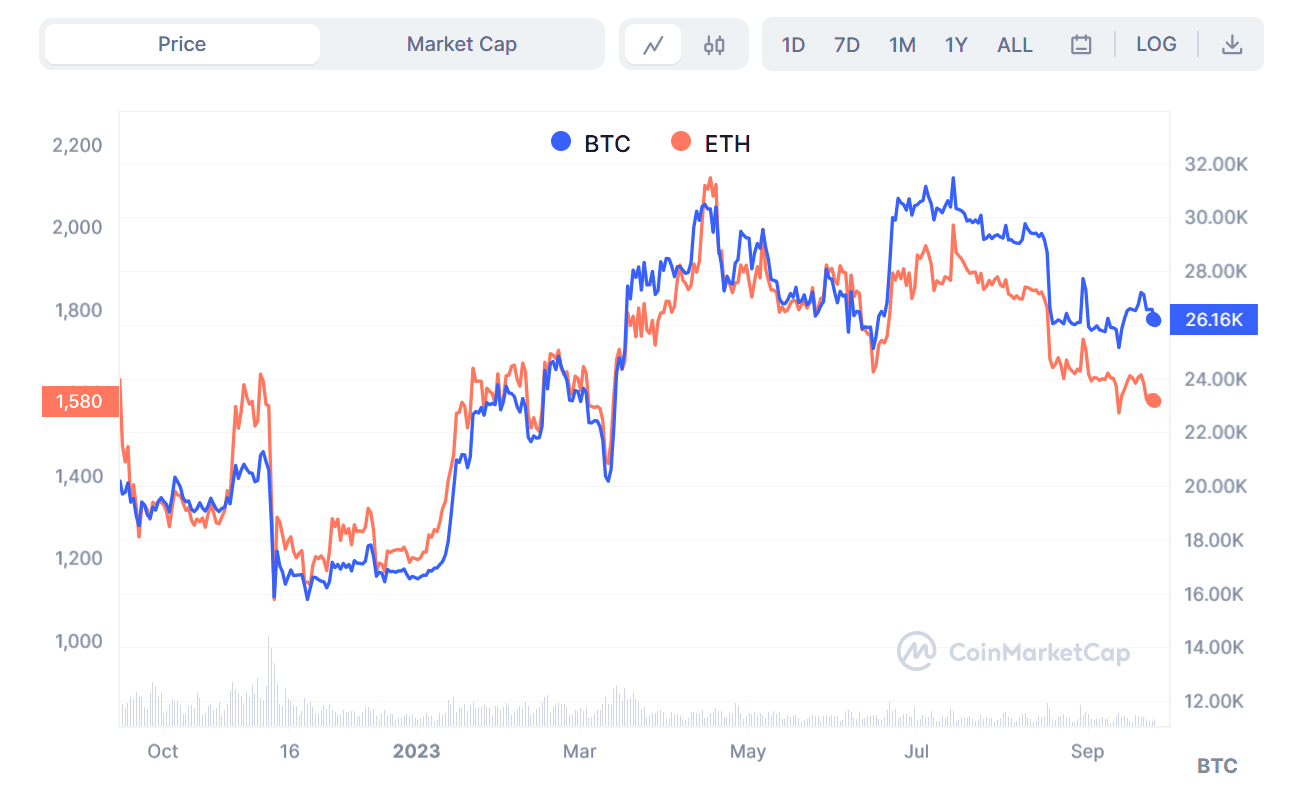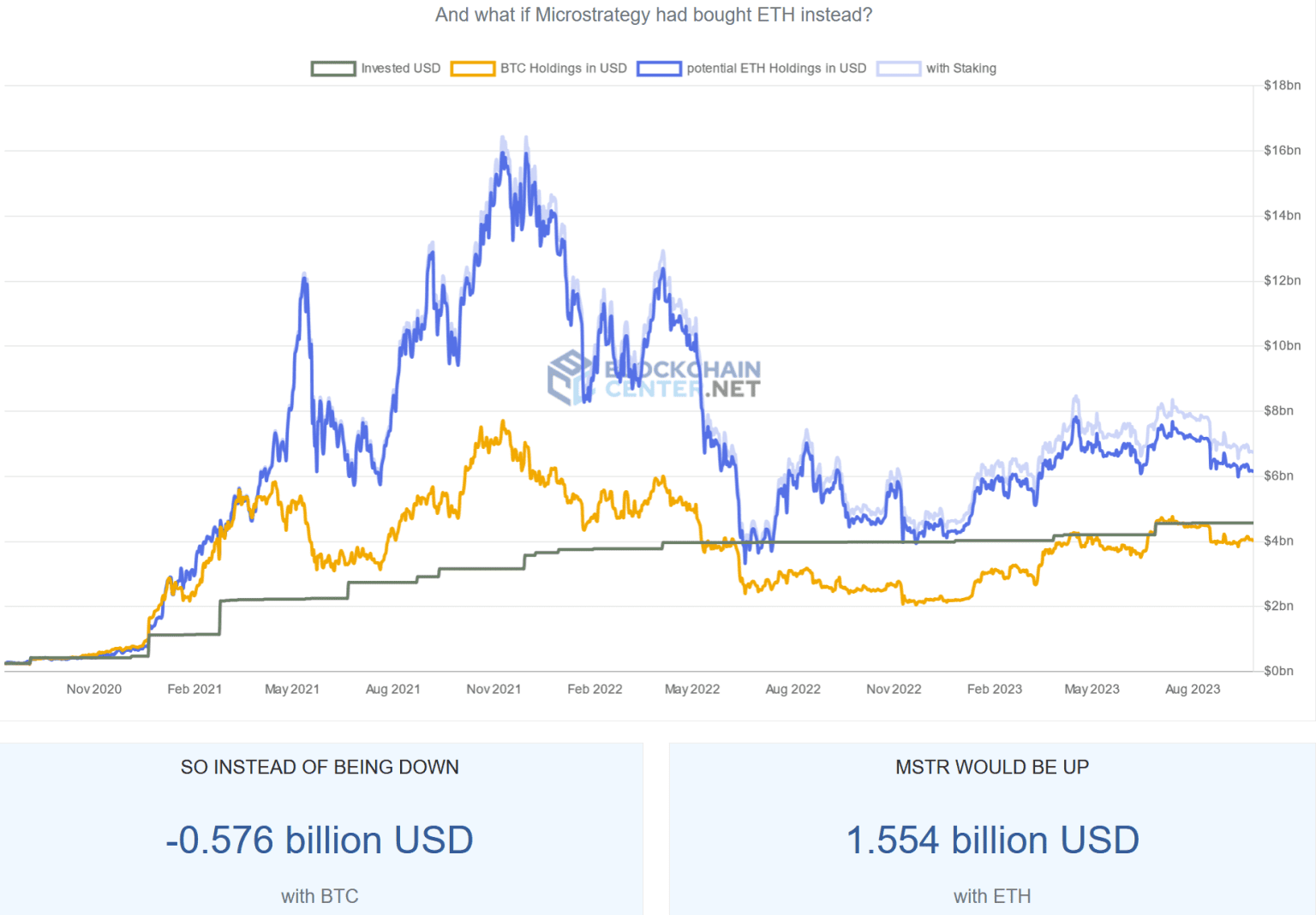News - The Flippening: Can Ethereum ever overtake Bitcoin?
By
The Flippening: Can Ethereum ever overtake Bitcoin?
The term "flipping" has been haunting the crypto world for several years. It describes the hypothetical scenario in which Ethereum (ETH) overtakes Bitcoin (BTC) as the most valuable cryptocurrency, and it has always been controversial in cryptocurrencies. So in this article, we look at which arguments are for flipping - and which are against it.
The arguments for Bitcoin
Bitcoin's first block was created in 2009. Since then, no other coin have been able to dethrone the Orange currency. Investors continue to view BTC as the safest and most decentralized crypto in the world. Its limited supply (up to 21 million BTC) is comparable to the scarcity of gold, which is why the number one in the crypto space is often referred to as "digital gold." This is one of the reasons why Bitcoin is still the first choice for institutional investors looking to get into the crypto sector.
If you look at Bitcoin's performance since the Ethereum merger on Sept. 15, 2022, the trend is that the BTC price has risen more than Ethereum's since then.
But Bitcoin also receives criticism, mainly because of its energy-intensive and, for some, unsustainable proof-of-work consensus model in the long term. In addition, Bitcoin's use cases are primarily limited to storing and exchanging value, which could limit BTC's long-term potential. Still, there are a number of reasons that suggest Bitcoin will remain the undisputed number one crypto space in the future.
Reasons why Ethereum can't overtake Bitcoin
There are several reasons why Ethereum is unlikely to overtake Bitcoin. First, BTC has firmly established itself as the leading cryptocurrency. Especially in times of crisis, investors tend to withdraw their money from altcoins and invest in Bitcoin, although Bitcoin's market dominance has rarely fallen below 40 percent in the past. On the other hand, financial giants such as Blackrock are planning to launch Bitcoin spot ETFs.
Bitcoin market cap is now nearly 3x Ethereum.
— Mando (@rektmando) June 28, 2023
Bitcoin dominance going wild.
Flippening now officially dead? pic.twitter.com/Qx0wx4z4CQ
This suggests that Bitcoin's market capitalization will likely continue to rise over the long term, reducing the likelihood of flippancy and underscoring BTC's importance among institutional investors as the leading cryptocurrencies. In conclusion, although Bitcoin is not directly compatible with smart contracts, cryptocurrencies seem to be finding more and more other use cases lately, as the hype around BTC Ordinals recently showed.
The case for Ethereum
As the second most valuable cryptocurrencies, Ethereum, unlike Bitcoin, has specialized in serving as the basis for a decentralized, blockchain-based Internet. A concept that finds its way into the term Web3. In addition to exchanging and storing value, Ethereum offers smart contract features that allow the creation of decentralized applications (dApps). This means Ethereum is aimed at a broader audience and various industries that want to develop automated programs through smart contracts.
Ethereum is like "digital oil" in this world: users need ETH to interact with the decentralized applications. Ethereum is therefore the centerpiece of an ecosystem on which applications in the areas of Decentralized Finance (DeFi) and Non-fungible Tokens (NFTs) are being built.
Why Ethereum could overtake Bitcoin in the future
At first glance, it does indeed seem that Bitcoin will retain its dominant position in the market. Especially considering the price trend since the merge.
But there are some compelling arguments that suggest Ethereum has a realistic chance of eclipsing Bitcoin in the future in terms of market capitalization. A look at a chart from the Blockchain Center shows that MicroStrategy's Bitcoin investment would have earned a higher return in hindsight than an Ethereum investment.
Moreover, MicroStrategy could have increased its returns even further by discontinuing Ethereum. Another argument in favor of Ethereum is the impact of the Ethereum Proof-of-Stake upgrade, known as "The Merge." This important transition not only made the Ethereum network more environmentally friendly and energy efficient, but also optimized system integrity and scalability.
This has resulted in improved transaction times and higher transaction capacity through simplified application of Layer 2 scaling solutions. The introduction of strike in this context allows ETH holders to receive additional rewards by locking their tokens, creating an even greater financial incentive to invest. The environmental benefits and associated economic incentives of PoS could increase the long-term interest of institutional investors, making Ethereum even more attractive overall.
Ethereum is less inflationary than Bitcoin
Ethereum's so-called burn rate has attracted a lot of attention. This mechanism, introduced by the EIP-1559 upgrade, reduces the overall supply of Ethereum. And if demand is consistent or growing, it could have a positive impact on the price. This could attract additional investment in Ethereum and further increase market capitalization.
Finally, the enormous potential of Ethereum's smart contracts and utility functions should not be underestimated. Ethereum has revolutionized the smart contract market and remains the undisputed leader in this sector, despite the emergence of other platforms supporting smart contracts.
THE ETHEREUM MERGE THIS YEAR COULD VERY WELL BE THE MOST BULLISH EVENT IN OUR LIFETIME AS ETH WILL MOVE TO PROOF OF STAKE, REDUCE ISSUANCE BY 90% AND REDUCE ENERGY CONSUMPTION BY 99.5% WHICH COULD START THE BTC FLIPPENING AND THIS IS HAPPENING NEXT MONTHpic.twitter.com/ZUby9ybPzY
— LilMoonLambo (@LilMoonLambo) August 5, 2022
Conclusion
The debate over whether Ethereum will ever be able to overtake BTC will continue to divide the crypto community. Both currencies have their strengths and will likely continue to play a dominant role in the cryptocurrencies world.
It is important to emphasize that both cryptocurrencies have different goals: Bitcoin positions itself as a kind of digital reserve currency, while Ethereum has ambitions to become the backbone of a decentralized digital economy. It is uncertain if and when a so-called flipping will take place. Ultimately, market mechanisms such as supply and demand, as well as the two networks' continued innovation, regulation and general adoption of crypto currencies will be deciding factors.








